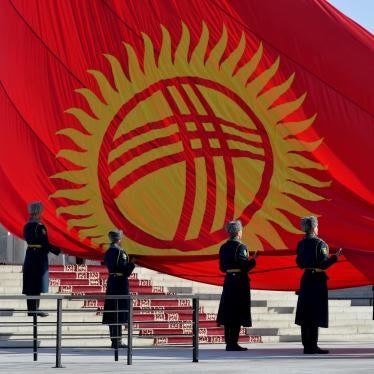Norway has long been an international human rights champion, leading on the international campaigns to ban landmines and cluster munitions, and more recently taking a pioneering role in the Safe Schools Declaration, which protects children from wartime violence. But Prime Minster Erna Solberg faces a tough test in upholding that reputation for leadership when she arrives in Beijing on April 5.
In 2010, China punished the Norwegian government and put bilateral relations on the ice when the Nobel Committee—a private organization with no relation to the government—awarded its Peace Prize to the imprisoned Chinese dissident Liu Xiaobo. After six years, the two governments finally resumed relations in December.
The Sino-Norwegian joint statement announcing the thaw had Norway pledging that it would not “support actions that undermine [China’s core interests], and will do its best to avoid any future damage to bilateral relations.” That an established democracy should parrot the line of an authoritarian power is both absurd and deeply troubling. Consequently there is intense international attention to Solberg’s visit, the first by a Norwegian leader to China in several years. Will she stand up for the human rights of the Chinese people, or blink in the face of pressure?
Given that Solberg’s visit is taking place during President Xi Jinping’s great leap backward on human rights, speaking up is all the more critical. Under Xi, who took power in March 2013, the Chinese government has tightened its grip on fundamental liberties, including freedom of expression, association, and religion, and on the rights of minorities. The government has adopted new restrictions on interactions with foreign nongovernmental organizations and religious groups, as well as increasingly detaining foreigners and broadcasting their forced confessions.
The visit is expected to focus heavily on bilateral trade. But trade best flourishes when there is government transparency, accountability, and a free flow of information. How can Norwegian businesses thrive in China if they cannot count on a fair justice system, especially when they run into conflict with local governments, or with state-backed businesses? These challenges are well-known. The 2016 American Chamber of Commerce report on China, for example, cites “inconsistent regulatory interpretation and unclear laws” as the top challenge reported by American businesses in China.
Some might still be wary of pressing for rights for fear of again provoking China’s wrath. But it is important to distinguish the Chinese government’s threats from their actual impact. Even after China’s outrage over the 2010 Nobel Prize, trade between the two countries rose by 19 percent between 2011 and 2012. And even when a thaw seemed unlikely, Norway made a principled decision in 2016 to join an unprecedented joint statement at the United Nations Human Rights Council condemning human rights abuses in China.
If Solberg fails to push on human rights, Norway will look dangerously weak across the breadth of the relationship. To avoid that, she should press publicly for the release of human rights lawyers such as Xie Yang who have been tortured and detained since July 2015, and raise concerns over the abductions of foreign nationals from outside China’s borders, including the Swedish bookseller Gui Minhai. She should also press for repeal of China’s abusive new state security laws, including the Cybersecurity Law—which further hampers access to the internet and foreign technologies for businesses operating in China—as well as the Foreign NGO Management Law.
And, yes: Solberg should also have the courage to urge China to free Liu Xiaobo. Strong intervention on even the most sensitive issues will tell us which Norway has visited China.







